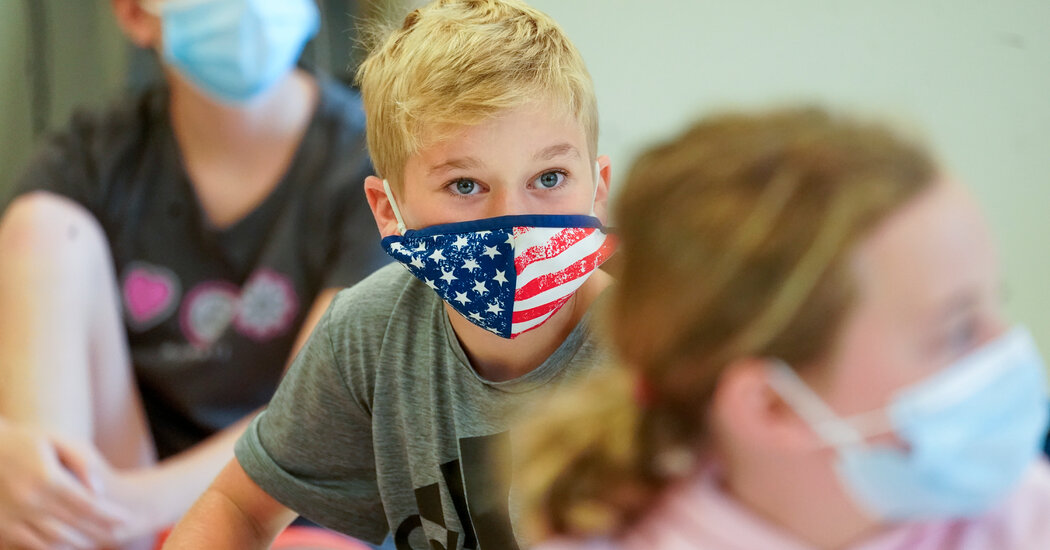Big questions arise in the upcoming back-to-school season: Do children have to wear masks? Should the children even go to face-to-face classes?
If we send children to school without masks, we increase their risk of developing Covid-19. Some could get sick or die. If we close schools, millions of children will experience learning loss, and many of them can have lifelong effects on their physical and mental health.
For more than a year, we’ve worked with school districts and charter schools in North Carolina to investigate the rate of new Covid cases, the effectiveness of mitigation measures like masking, and the increased risks of participating in school-sponsored sports. We’ve learned a couple of things for sure: While vaccination is the best way to prevent Covid-19, universal masking comes second, and with masking, school learning is safe and more effective than distance learning regardless of community infection rates.
Vaccination is the most powerful way to prevent the negative effects of Covid, but students under the age of 12 are not eligible for the vaccines. Masking is therefore one of the best and easiest methods available to protect them from the disease, with universal masking being one of the most effective and efficient strategies to prevent the transmission of SARS-CoV-2 in schools.
Universal masking in schools can save lives. Voluntary masking in schools is likely to be much less effective and could lead to school closings and community transfers. This summer, we saw voluntary masking fail at some schools in Missouri and North Carolina, leading to an increase in Covid-19 cases and missed days due to quarantines, prompting several counties to restore mask mandates.
Opinion interview
Questions about the Covid-19 vaccine and its introduction.
How do we know that masking helps prevent the spread among unvaccinated people in schools? In July 2020, we and our colleagues developed the ABC Science Collaborative to bring scientists together with school and community leaders to ensure school leaders have the most up-to-date scientific information on Covid-19 and K-12 schools. Working with North Carolina, the ABC Science Collaborative collected data from more than one million students and staff in the state’s schools from March to June 2021. Certain school districts in North Carolina were required by bipartisan law to submit infection data to the ABC Science Collaborative as a trusted third party.
During that time, more than 7,000 children and adults contracted the coronavirus and attended school while contagious. Due to the close contact with these cases, more than 40,000 people have had to be quarantined. However, through contact tracing and testing, we only found 363 additional children and adults infected with the coronavirus. We assume that this low transmission rate is due to the mask-on-mask school environment: Both the infected person and the close contacts wore masks. Schools offered this protection without expensive screening tests for the coronavirus or massive overhauls of ventilation systems.
Since North Carolina had a mask mandate for all K-12 schools, we couldn’t compare masked schools to unmasked schools. To understand what preventive masks can have, we looked outside of North Carolina for comparisons. Data from our research and studies done in Utah, Missouri, and Wisconsin show that school transmission rates of the coronavirus were low when schools enforced masking requirements. In contrast, a school in Israel with no mask requirement or adequate social distancing protocols reported a Covid-19 outbreak involving 153 students and 25 staff.
The recent outbreaks in youth camps in Texas, Illinois and Florida show how quickly Covid-19 can spread among largely exposed and mostly unvaccinated teenagers and adults, with the possibility of spreading to surrounding communities. The potential for this type of community expansion was the reason schools closed their doors in March 2020.
Now that it is clear that universal masking is associated with less spread, why not demand universal masking? Why try to gather hundreds of unvaccinated, unmasked people in a closed room for several hours a day, five days a week?
Schools that don’t require masks will transmit more coronavirus. And while the April Covid mortality rate of more than 50 million public school children in the US was just two per 100,000 school-age children, that could still mean many preventable child deaths in a year.
Once vaccination is available to all children, districts can best serve their students by providing incentives to promote masking and vaccination. For example, if universal masking is enforced or a student is being vaccinated, it is reasonable for schools to choose not to require quarantine or post-exposure testing for asymptomatic children and adults. Similarly, schools may consider allowing vaccinated students participating in extracurricular activities to continue even after exposure to someone who tests positive. School districts that do not have universal masking should continue to employ strategies such as ventilation and social distancing, and continue to conduct routine tests for unvaccinated students.
A spike in Covid is likely in schools that choose to open without a mask requirement and with limited vaccine intake. Until all children can be vaccinated, masks remain a well-researched solution for reducing the risk of Covid infection. Children should be in school and we should take the measures that can protect them.
Kanecia Zimmerman is an Associate Professor of Pediatrics at Duke University School of Medicine. Danny Benjamin Jr. is a pediatric infectious disease specialist at Duke Health and the Kiser Arena Professor of Pediatrics at Duke University School of Medicine.
The Times strives to publish a wide variety of letters to the editor. We’d love to hear your thoughts on this or any of our articles. Here are some tips. And here is our email: [email protected].
Follow the “The New York Times Opinion” section on Facebook, Twitter (@NYTopinion) and Instagram.
